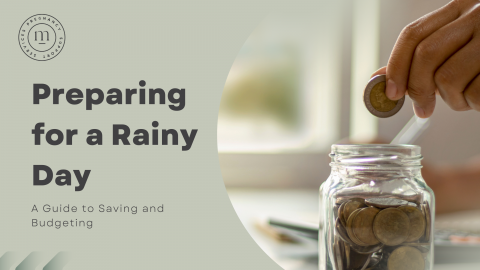
Life is full of uncertainties, and unexpected events can often catch us off guard. Whether it's a sudden medical expense, a car breakdown, an unexpected job loss, or maybe even an unexpected pregnancy, having a financial safety net in place can provide immense peace of mind. As young adults, this is the perfect time to develop healthy saving and budgeting habits. In this blog, we will explore the importance of saving for a rainy day and share practical tips to help you build a solid financial foundation.
-
Why Saving for a Rainy Day Matters:
Saving money may not seem like a priority when you're young and enjoying life's adventures, but having a safety net is crucial for future financial stability. Here's why saving for a rainy day matters:
a) Emergency Preparedness: Unexpected events can happen at any time. Having savings can help you cope with emergencies without resorting to borrowing or falling into debt.
b) Peace of Mind: Knowing you have a financial cushion provides mental comfort and reduces stress during tough times.
c) Future Planning: A well-funded rainy-day fund can also serve as a stepping stone for achieving long-term financial goals like purchasing a car, paying for higher education, or even investing.
-
Budgeting Basics:
Creating a budget is the first step towards saving for a rainy day. By tracking your income and expenses, you can identify areas where you can cut back and save more. Here are some budgeting basics to get you started:
a) Track Your Expenses: Use apps or online tools to track your spending for a month. Categorize your expenses to understand where your money is going.
b) Set Financial Goals: Determine how much you want to save for your rainy-day fund and set achievable milestones. Breaking it down into smaller goals makes it more manageable.
c) Prioritize Essentials: Prioritize essential expenses like rent, groceries, utilities, and loan payments. Allocate a portion of your income to savings right at the beginning of the month.
-
Practical Saving Tips:
a) Automate Your Savings: Set up an automatic transfer to move a portion of your income into a separate savings account each month. This way, you won't be tempted to spend the money before saving it.
b) Reduce Unnecessary Expenses: Identify areas where you can cut back on spending, such as eating out, entertainment, or impulse purchases. Redirect the money saved into your rainy-day fund.
c) Explore High-Yield Savings Accounts: Look for savings accounts that offer higher interest rates to make the most of your savings over time.
d) Limit Credit Card Usage: Credit cards can lead to debt if not used responsibly. Stick to using them for emergencies only, and pay off the balance in full each month.
e) Use Online Resources and Apps: There are numerous online tools and mobile apps designed to help you track expenses, set budgets, and save effectively.
In Conclusion
Saving and budgeting "for a rainy day" is an essential skill that every young adult should develop. By understanding the significance of an emergency fund and following practical saving and budgeting tips, you can build a strong financial foundation for your future. Remember, even small contributions to your savings can add up over time, ensuring that you're well-prepared to face any financial challenges that life may throw your way. Start early, stay disciplined, and watch your rainy-day fund grow steadily. Your future self will thank you!
If you find yourself facing an unexpected pregnancy and are not feeling financially prepared, please contact us to talk with one of our support workers. We can share with you the different supports we offer, the community resources available to you, and give you information on your options.
Contact us to make a confidential appointment.
Want some more help with your finances? Check out these community resources:
Kingston Non-Profit, Credit & Debt Counselling Services | Ontario (nomoredebts.org)
Financial Wellness - Resolve Counseling Services Canada (resolvecounselling.org)
Ontario Works - City of Kingston
By: Elizabeth, Executive Director
References:
- "The Importance of Building an Emergency Fund" - The Balance Link: https://www.thebalance.com/importance-of-building-an-emergency-fund-4160626
- "Budgeting 101: A Step-by-Step Guide to Budgeting for Beginners" - NerdWallet Link: https://www.nerdwallet.com/article/finance/budgeting-savings/budgeting-101
- "15 Smart Money-Saving Tips for Young Adults" - Forbes Link: https://www.forbes.com/advisor/personal-finance/smart-money-saving-tips-young-adults/
